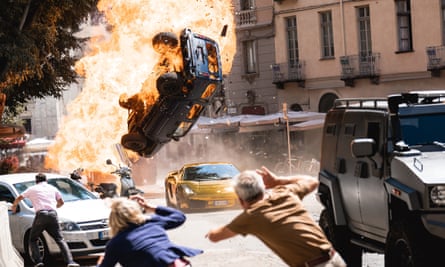I loved David Starkey’s documentaries when I was a kid. His confident erudition, his capacity to sum up a person or idea in a wonderfully pithy phrase: he made history come alive to me more than any teacher I had at school. Then something happened in the summer of 2011.
Starkey appeared on BBC’s Newsnight to discuss the riots that engulfed London that August. On it, he said that white working-class people in Britain “had become black”. By this, he meant “a particular sort of nihilistic, gangster culture has become the fashion”.
I am not shocked any more. Speaking at the National Conservatism conference in London last week, Starkey said of the Black Lives Matter movement: “They do not care about black lives, they only care about the symbolic destruction of white culture.”
What does “white culture” mean? Elsewhere in the speech, he mentioned the threat faced by western civilisation, making the same equation between race and culture as he did on Newsnight. He associates “black culture” with violence and thuggery. Western civilisation, by contrast, is an example of white culture.
But when I watch Starkey’s old documentaries on Tudor England, or read the novels of James Joyce, or listen to Mozart, or look at paintings by Vermeer, or watch the films of Fellini, I don’t feel like I’m being absorbed into a culture defined by race. How philistine to limit western civilisation to whiteness: the vast riches of music, history, literature and visual art reduced to the narrow politics of skin pigmentation.
What I find piercingly sad is Starkey’s abdication of humanist principles; the scholar has mutated into a foul polemicist. Western civilisation belongs just as much to a black kid in inner-city London as it does to a white historian and broadcaster.
Same difference?
Leftwing journalist and author Naomi Klein has written a book about being confused with the leftwing journalist and author Naomi Wolf. Klein is most famous for her anti-capitalist book No Logo. Wolf is known for her feminist book The Beauty Myth and for peddling conspiracy theories and misinformation about Covid-19 vaccines. I can see why Klein would want to dissociate herself from Wolf.
I myself have confused the handsome Canadian actor Ryan Gosling with the handsome Canadian-American actor Ryan Reynolds. They don’t look alike, but there’s something about their shared first name, shared country of birth, shared profession, and their good looks that has made me group them together. Resemblance is more than just physical appearance.
You know you’ll love it

The trailer for the seventh Mission: Impossible film was released last week; the 10th Fast and Furious came out on Friday. Both films could end up being excellent (in general, I am a fan of the Mission: Impossible films and the spy-action genre) but there’s a part of me that thinks with a sigh: “Oh God, another crop of franchise films.”
I know why it’s done. So much money is involved in the film industry, and there are so many ways a film can go badly. For a book to be good, at least on its own terms, all you need is a good writer and some good editors. For a film to do well, you need a good screenwriter, a good director, a good producer, a good set of actors, a good line producer, a good film editor, a good cinematographer, good camera-operators, good set and costume designers…
The executives want to make safe bets. And what can be safer than banking on a franchise: a familiar set of characters, a familiar film universe. But the cineaste in me also craves something new. So I will watch Mission Impossible – Dead Reckoning Part One this summer, but I will also try to watch as many original films as I can.

